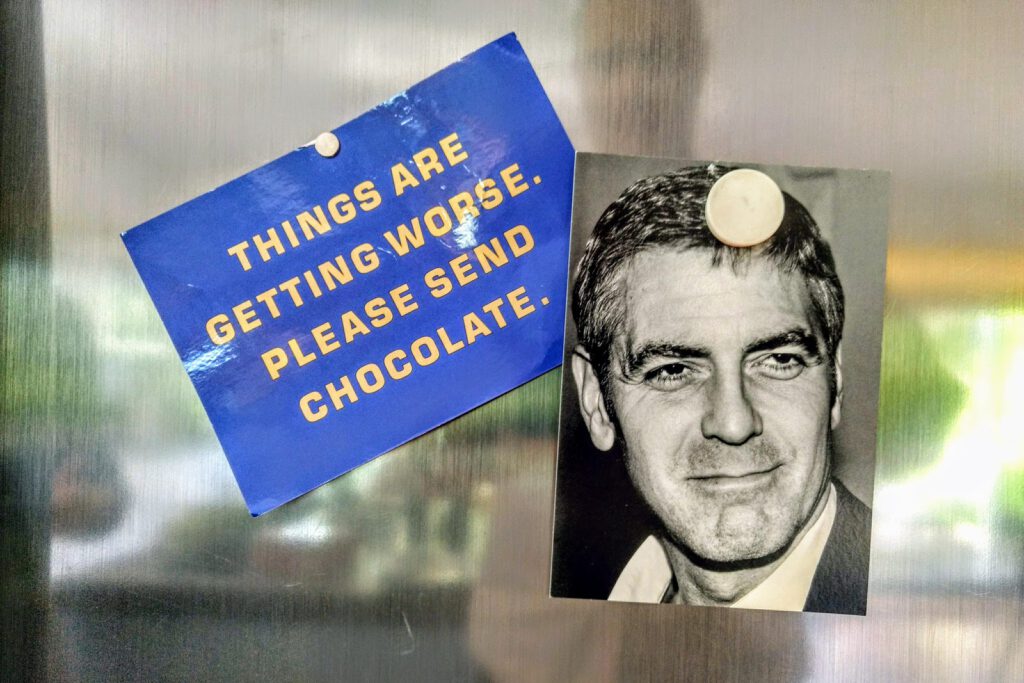
This blog post is in English and an experiment. I had to translate it for a job application and didn’t want to leave it lying around. (All that sweat, what a waste; I didn’t get past the first round.) For Dutch readers: you’ve already read this one.
Changing bad habits is incredibly difficult – and I’m paraphrasing pretty much all the experts who know what they’re talking about. This blog was initially set up because I intended to write about minimalism related issues. But if you want to contribute something to the environment and/or your savings account, it’s useful to know how to grow a new habit or break an old one. In my case that can be anything from not snacking after dinner (not yet succeeded in that one), more physical exercise (partial success) to working less hours (succeeded in that for the first time in years). Below are a few insights that helped me.
As discussed earlier on this blog, I’m pretty strict and have a lot of self-discipline. But the little voice inside my head says I should be exercising more, and I have been wanting to take up yoga and meditation for years. My diet is pretty healthy as it is, but I’m a sucker for peanut butter, chocolate and ice-cream. I’d also like to read more books, take up volunteer work again, worry less and take better care of my eyes because I spend long days in front of my laptop screen and despite laser surgery years ago, they’ve been deteriorating rapidly.
I often read that learning a new routine takes 66 days on average. I’d like to add that in my view this also depends on the individual in question, the routine itself and how relevant and frequent it is for and in your daily life. Bear in mind that if you’re unable to sit quietly on a meditation cushion for ten minutes after trying it for one week (not a random example), it doesn’t necessarily mean you’ll never succeed. And no, you’re not a total failure either. However to my frustration, my brain seems to master “bad” habits a lot faster than those aforementioned 66 days. If I drink alcohol for a few days in a row, I am already so conditioned on day 4 that when the end of the afternoon comes around, I really have to be firm with myself.
Routines are all fine and dandy, but foremost: they are a whole lot easier for your brain. Routines require less thought power. That’s why it’s smart to always put your keys and wallet in the same place. Because that means that when you have to go out and your mind is occupied with all kinds of more urgent matters, like will I not miss this train, you won’t have to think about where your keys are. Less stress, in other words. One of the tricks in learning a new habit that works for me, is to incorporate it into an existing routine. And 2: to start with baby steps. 3: it helps to link it to a certain time, as Eveline Aenderkerk, director of the CPNB, suggested that reading a book should become like “a cup-a-soup moment“.
For instance, you can start by doing a few squats while brushing your teeth. Or why not add a five minute meditation to your regular coffee or tea break? By the way, these are not things I actually do myself, but I do apply the principle. Basically, I don’t want to have to think too much about a new habit, and it shouldn’t take too much effort to begin with. If it takes all kinds of preparations, like putting on specific exercise clothes and stretching, for me that equals an instant “never mind”-moment. Really putting in an effort is something I’ll get to later (or not at all, because I often never reach that stage). But if you already exercise a little bit every day (even if it’s only those few squats), it’s a much smaller step to actually then start running instead of having to get off the couch and oof, putting on your running shoes, finding the right music, and where is that smart watch?!… before going out in the rain. For me, doing something each single day turned out to be good advice. B. J. Fogg, Stanford’s “tiny habit expert”, started off by doing two push-ups after going to the bathroom. And nowadays he does forty to eighty of those a day.
Once you’ve already started running or roll out your yoga mat fairly frequently – these are totally random examples – then apparently it’s smart to put your workout clothes somewhere where you can see them and to make sure they are nice instead of scruffy old ones. Bright and/or beautiful colors that make you happy, apparently help. The opposite is just as true. In my case that implies that I store my chocolate in the back of the kitchen cabinet instead of in plain sight out on the counter, were I do display things like cherry tomatoes and cucumber.
Laura Vanderkam writes about time management and productivity, among other things, and she recently had a nice eye-opener in her newsletter. She compared working on a project (which can also be working on yourself) with an Ikea manual. In other words, break something big up into small steps. For example, this blog was not a matter of “oh hey, nice idea, yes, let’s do this!”, and then www.destillekat.nl was online in less than a week. No, just like assembling an Ikea cabinet, you need tools, and with that I also mean a certain amount of will power. And you need to realize that (usually) these things take time. Don’t forget patience either. And yes, sometimes things go wrong. That comes with the territory. But these days I don’t put myself out with the garbage anymore when I mess up. Because sometimes, it suddenly dawns on me that while struggling with step 5a, that also means that step 1 to 4 are behind me and were not half as frustrating as I had feared.
(to be continued)

Wat jammer van de sollicitatie!
Een sollicitatie! Daar willen we natuurlijk ook alles over horen.
De beste manier om niet helemaal in het boekvertalen te verzuipen is er iets naast te doen. (Meteen ook de beste manier om helemaal geen leven meer te hebben, helaas.)
Dank jullie wel, allebei! Ik had gehoopt dat deze post niet zou opduiken door hem te antedateren. Want het is hartstikke oud nieuws en schaamteloos gerecycled. ?
Ik had gesolliciteerd als freelance onderzoeker bij een schrijver die ik heb vertaald en die ook veel op het vlak van psychologie doet. Ik vond zelf dat ik er geknipt voor was. ? Maar niet dus.
Nee hoor, de beste manier om er niet in te verzuipen is om ermee te stoppen.
Klinkt inderdaad als een leuke baan, waar jij vast geknipt voor bent. Dan zit er dus maar één ding op: zelf dat boek gaan schrijven ;).
Haha! Inderdaad, Leen. Jij kunt het weten. Ook dat je dan helemaal geen leven meer hebt, helaas.?
Maar wel een leuker (geen) leven!
@Leen: hmmmmm, dat is misschien wel waar.
Ik hoorde trouwens vandaag na navraag eindelijk dat ik niet door ben naar de 2e ronde omdat ik geen psychologie heb gestudeerd.
Ik ben benieuwd wat wij volgend jaar allebei om deze tijd doen! En laten we er geen wedstrijdje van maken welk boek als eerste klaar is. ?
Why not apply your habit-advice to your book-writing? Just write a little bit each day. It doesn’t have to be much. You just need to do it everyday. Your production might not be high, but who cares? There are too many books out there anyway. Just take the time to make that book really good. Would that not be satisfying?
That’s exactly what Laura Vanderkam wrote once. Ten minutes a day and in the end you will have a book. (Btw, I’ve stopped subscribing to her newsletter, but I mentioned her here before.)
So, given that you have the time to write blog posts, you effectively also have the time to write that book, right? It is just a matter of priorities.
Haha, Annoesjka, dat klinkt alsof je er niet meer onderuit komt! Ik bied me bij dezen aan als meelezer.
Haha! Ik had nooit met dit blog moeten beginnen… En eh, dank Peter & Leen. I think ?